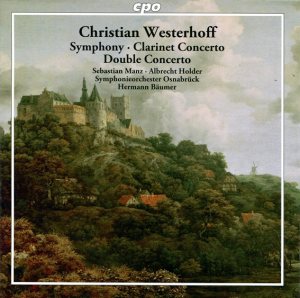 |
 |
|


alternatively
CD: MDT
AmazonUK
AmazonUS
Sound
Samples & Downloads |
Christian WESTERHOFF
(1763-1806)
Clarinet Concerto in B flat, Op. 5 [18:50]
Concerto for Clarinet, Bassoon, and Orchestra in B flat [22:14]
Symphony in E flat [22:05]
 Sebastian Manz (clarinet); Albrecht Holder (bassoon)
Sebastian Manz (clarinet); Albrecht Holder (bassoon)
Osnabrück Symphony Orchestra/Hermann Bäumer
rec. 17-22 May, 2010, Stadthalle Osnabrück, Germany
 CPO 777 598-2 [63:09]
CPO 777 598-2 [63:09]
|
|
|
Really very little is known about Christian Westerhoff except
that his music is wonderful. If you like the music of the late
1700s, it will be of very great appeal; the clarinet concerto
sparkles and the symphony is a charmer of serious craft for
someone so little-known.
Westerhoff was composing at the same time Beethoven got his
start, but he lived in the patronage system more commonly associated
with his predecessors, becoming concertmaster to the ensemble
of a certain Princess Juliane von Schaumburg-Lippe. Very shortly
before Westerhoff’s arrival, the position had been vacated
by Johann Christoph Friedrich Bach. The job had an unfortunate
tendency to see its occupants die young, and by the age of 42
- or maybe 43; apparently we’re not sure - Westerhoff
too was gone.
Very few scores of his remain, including these three works,
a flute concerto and a viola concerto. Of the pieces on this
CD only the Clarinet Concerto Op 5 was ever published (1798),
and its appeal would have been obvious: in just under twenty
minutes, it wins us over with a refined pastoral mood and felicitous
writing for the solo instrument. The clarinet enters immediately
with the main theme and then bows out for the duration of the
orchestral introduction, much like Beethoven’s Fourth
Piano Concerto, which debuted almost a decade later. The finale
is a theme and variations the ending of which is especially
pleasing. The clarinet concerto is actually the inspiration
for this CD: it was rediscovered by the celebrated soloist Dieter
Klöcker, who died in 2011 leaving a legacy of acclaimed
recordings on EMI, MDG, CPO, Marco Polo and other labels. Klöcker
worked wonders for clarinet fans by enormously expanding our
knowledge of classical- and romantic-era works; his passionate
sleuthing for more great music is what revealed the Westerhoff
concerto, which he then passed on to budding star Sebastian
Manz. Manz composed a short but quite clever cadenza for this
recording at Klöcker’s suggestion.
The other two works are equally fine: a double concerto sees
the clarinet and bassoon really treated as equals; I am quite
impressed by Westerhoff’s willingness to give the bassoon
big solos, lyrical lines, and virtuoso material, rather than
treating it as the lesser of two partners. Unlike the clarinet
concerto, this piece launches with a more substantial orchestral
introduction. Otherwise the pieces are very similar: both in
B flat, both with identical tempo markings, both notable for
the substance and playfulness of their finales. The first movement
does get a little too long for its material, but the soloists
also have a lovely duet-cadenza. Westerhoff’s adagios
aren’t much, but he knows it so he shifts the center of
gravity to his clever endings; the double concerto finale features
an intermittent orchestral line that recalls Haydn’s Bear
symphony.
Then we have the Symphony in E flat, for slightly expanded orchestra
with timpani, which has a stately introduction before taking
off the mask and launching into a whirling delight of a poco
presto, featuring a bassoon solo and some writing for trumpets
and horns which sounds a lot like the early Schubert
symphonies. The finale is again a highlight, and again foreshadows
early Schubert.
The Osnabrück Symphony and Hermann Bäumer are at home
in the music, delivering with great style. These are modern
instruments, incidentally. Sebastian Manz repays the trust placed
in him by Dieter Klöcker, and Albrecht Holder revels in
the beefy bassoon part in the double concerto. With good sound
and an unusually (for CPO) interesting booklet note containing
Manz’s recollection of a conversation with Klöcker,
this is an easy choice for anybody who likes music from the
late classical era.
Brian Reinhart
|
|















